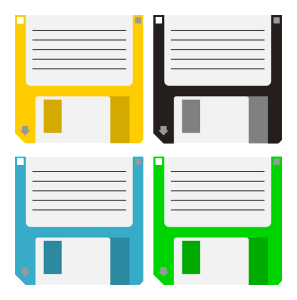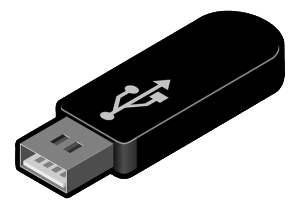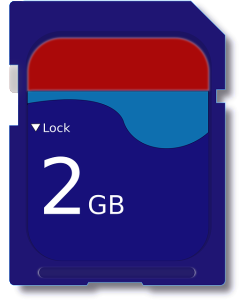 Until recently I owned hundreds, if not thousands, of computer storage devices. Not just CD’s, hard drives and USB sticks but 3½” & 5¼” floppy disks, DAT tapes, cassette tapes and even a few ROM cartridges from a long forgotten computer console I owned in the early 1980s. A significant life event made me question whether this plastic mountain, stuck in a perpetual digital purgatory, was worth keeping. I no longer owned the appropriate devices to enable me view the contents of each storage device and it was taking up way too much space in my home. After much thought and with a sad heart I decided to dump the lot. I now regret that decision. While I’m sure my electronic files consisted of nothing more than a few poorly constructed Word documents from my university days, a handful of excel spreadsheets where the most sophisticated cells made use of bold and perhaps even a few early digital photos, I still worry that I’ve destroyed some important image, audio, text or file that I, or someone else, may one day need. I’m sure I’m not the only person who has deleted or trashed old devices for the same reasons as I and a recent interview given by the VP of Google, Vint Cerf, made me think again about the so-called Digital Dark Age.
Until recently I owned hundreds, if not thousands, of computer storage devices. Not just CD’s, hard drives and USB sticks but 3½” & 5¼” floppy disks, DAT tapes, cassette tapes and even a few ROM cartridges from a long forgotten computer console I owned in the early 1980s. A significant life event made me question whether this plastic mountain, stuck in a perpetual digital purgatory, was worth keeping. I no longer owned the appropriate devices to enable me view the contents of each storage device and it was taking up way too much space in my home. After much thought and with a sad heart I decided to dump the lot. I now regret that decision. While I’m sure my electronic files consisted of nothing more than a few poorly constructed Word documents from my university days, a handful of excel spreadsheets where the most sophisticated cells made use of bold and perhaps even a few early digital photos, I still worry that I’ve destroyed some important image, audio, text or file that I, or someone else, may one day need. I’m sure I’m not the only person who has deleted or trashed old devices for the same reasons as I and a recent interview given by the VP of Google, Vint Cerf, made me think again about the so-called Digital Dark Age.
The phrase Digital Dark Age refers to a future time when it is no longer possible to read/open/utilise/etc some obsolete file format. For example, while my current version of Word will open any older version of Word will it always continue to do so? How can I be sure that it will display the file in the same format that I originally intended? This problem is beginning to happen for me right now, in 2015. When opening an Excel document I am sometimes warned that as I am using Office 2013, and trying to open an Office 2007 file, some cells may not display correctly. Fast forward 50 years – how different will the cells be displayed? Will they be displayed at all? Vint Cert, and myself included, are concerned that the end of the 20th and start of the 21st centuries will be ‘dark’ when future historians will not be able to access documents as they are not being archived or stored in a suitable file format. I’m sure that my files won’t be of much interest to anyone in 5 years time let alone 50 but what about government departments, family historians and academics to name a few, they may need access to our files from today.
 Digital images are also of concern. We’re all guilty of taking a quick snap and storing it on a phone, copying it to a CD or saving it onto a memory stick. I’ve lost loads of photos this way. Vint Cert suggested that we should print out our photos to ensure that they are preserved. This is a dreadful idea. I’ve lost count how many times I’ve visited an antique shop and on sale are B&W photos of weddings from the early 20th century. I can only assume that they have ended up in the shop as the husband and wife, in the photo, have passed away and the subsequent owners of the photo aren’t even sure who the images are actually of. If digital images are stored in the right place and filed using the right software then its possible to help future historians by tagging the photos with names and any other useful details. I’m already doing this and am about to scan my parents entire photo collection to enable all faces to be tagged before their identify is forgotten. A by-product of this process is that the photos don’t just sit in my parents attic gathering dust but I, my parents and my sisters can all have concurrent access to this vast collection of images.
Digital images are also of concern. We’re all guilty of taking a quick snap and storing it on a phone, copying it to a CD or saving it onto a memory stick. I’ve lost loads of photos this way. Vint Cert suggested that we should print out our photos to ensure that they are preserved. This is a dreadful idea. I’ve lost count how many times I’ve visited an antique shop and on sale are B&W photos of weddings from the early 20th century. I can only assume that they have ended up in the shop as the husband and wife, in the photo, have passed away and the subsequent owners of the photo aren’t even sure who the images are actually of. If digital images are stored in the right place and filed using the right software then its possible to help future historians by tagging the photos with names and any other useful details. I’m already doing this and am about to scan my parents entire photo collection to enable all faces to be tagged before their identify is forgotten. A by-product of this process is that the photos don’t just sit in my parents attic gathering dust but I, my parents and my sisters can all have concurrent access to this vast collection of images.
Even the internet is at risk. How many webpages have been lost in these embryonic years of the webs development? I wrote my first, and rather basic, webpage in 1994 using HTML and it is no longer available to be viewed in all it’s glory again. There is a wonderful (and fun) online tool called the Internet Archive WayBackMachine which periodically scans and stores webpages. My 1994 webpage is archived but all of the images, wallpaper and some formatting has been lost. In fact, it is a snapshot taken in 1997 so anything that I uploaded between 1994 and 1997 has long since vanished. Of course, some archiving is better than none but this is a good example of how even relatively recent webpages are already being consigned to the digital wastepaper basket.
Finally, email is equally at risk from destruction. I receive and send around 150 emails a day from my work account and these are all nicely archived by my employer should they ever need to be accessed. However, I have two other personal email accounts which aren’t archived. How we will ever know the inner thoughts of today’s leading minds (I do not include myself on this list if you were wondering) if they are shared via email which is not archived? Much research of historical figures has been through the letters received and sent during their lifetime. I have spent many hours at the British Library reading the most intimate thoughts of many composers whom I have studied. By understanding a composers life at the time of a composition helps the listener better understand the musical meaning, message and purpose of their music. Whoever the leading minds of today’s world are, will we be able to understand them better at some later date without access to their emails?
 The solution? I have no solid answer. We could, as suggested by Vint, make printouts of what we consider important but this raises two important questions: 1) How do we know what will be important to future generations and 2) Surely this defeats the object of saving files electronically i.e. saving paper and reducing our carbon footprint? What is clear is that files, whether they be audio, images, videos, documents etc. these need to be stored in the cloud rather than on a physical device. If, for example, a USB memory stick breaks it is likely that the content will be corrupted or damaged beyond repair. At least storage in the cloud should prevent this. Of course, the obvious next question is about security. How can we be sure that our important documents, stored in the cloud, are only accessed by future researchers and not the criminals or hackers of today?
The solution? I have no solid answer. We could, as suggested by Vint, make printouts of what we consider important but this raises two important questions: 1) How do we know what will be important to future generations and 2) Surely this defeats the object of saving files electronically i.e. saving paper and reducing our carbon footprint? What is clear is that files, whether they be audio, images, videos, documents etc. these need to be stored in the cloud rather than on a physical device. If, for example, a USB memory stick breaks it is likely that the content will be corrupted or damaged beyond repair. At least storage in the cloud should prevent this. Of course, the obvious next question is about security. How can we be sure that our important documents, stored in the cloud, are only accessed by future researchers and not the criminals or hackers of today?
If you have any thoughts on the the Digital Dark Age and what steps we can take to prevent it, do share your thoughts below.


 Currently the Head of e‑Learning and a teacher of Music and Computing at a large school in
Currently the Head of e‑Learning and a teacher of Music and Computing at a large school in 
